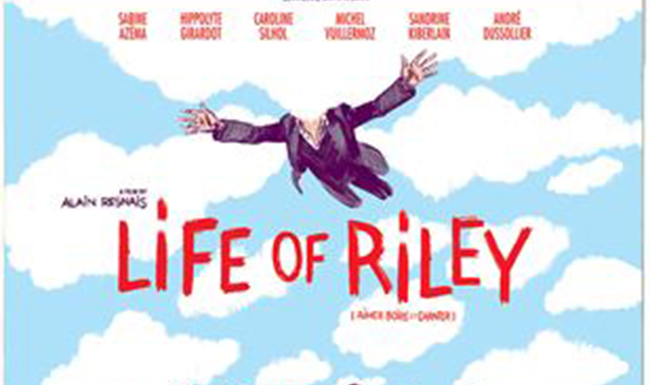
Life Of Riley Review
 When Alain Resnais died in 2014 a talent disappeared from cinemaland. Resnais, a master of the French conversation piece drama had a career that spanned from the 1950s until his death last year. It seemed as though he were continually making films with his last being this film, Life of Riley which was released shortly after his death at the age of 92 – that’s right he never really retired. The film, only given a very limited theatrical release is released on dual format DVD/Blu-ray in the Masters of Cinema series by Eureka! However, despite the films inventiveness it is a very dull affair and although in some way represents the mannerism of a Resnais film it lacks the merit and je ne sais quoi of his earlier films.
When Alain Resnais died in 2014 a talent disappeared from cinemaland. Resnais, a master of the French conversation piece drama had a career that spanned from the 1950s until his death last year. It seemed as though he were continually making films with his last being this film, Life of Riley which was released shortly after his death at the age of 92 – that’s right he never really retired. The film, only given a very limited theatrical release is released on dual format DVD/Blu-ray in the Masters of Cinema series by Eureka! However, despite the films inventiveness it is a very dull affair and although in some way represents the mannerism of a Resnais film it lacks the merit and je ne sais quoi of his earlier films.
Life of Riley (or Aimer, boire et chanter [Love, Drink and Sing] as it is translated into the French title) is a fairly direct adaptation of Alan Ayckborn’s play, Resnais has kept the setting of North Yorkshire, somewhere apparently between York and Harrogate and retains the French language. All we see of this is a montage of photographs of the city of York and country roads with distinctive dry stone walls. Otherwise the film is completely artificial and set in a small rep theatre and various houses or countryside with completely stylised sets representing these locations. The sets are a mixture of props and candy coloured cardboard cut-outs. After a while the artifice becomes annoying and nauseating on the retina. Elsewhere at a narrative shaking piece of dialogue the background becomes cross hatching in black and white.
As a filmmaker, even beyond being an octogenarian most of his cast, with the exception of one or two individuals in their 40s are beyond middle-aged and are typically what we would call middle-Englanders of a more cultured variety. The story centres on a group of friends and couples who belong to an amateur dramatic theatre company trying to rehearse for a play. One of their troupes, Colin has declared that George, a good friend to them all has been diagnosed with a fatal illness. Over the next few months the friends go through various processes of relationship bonds and break-ups as they prepare and rehearse the play and deal with George’s inevitable end.
Previous to this film, Resnais made a film called You Ain’t Seen Nothing Yet (2012) (Vous n’avez encore rien vu) that had a similar theme but was a film that was considered by many to be one of his better films of the past 20 years. Many praised Private Fears in Public Places (2006), but for my money Smoking/No Smoking was his best film of this later period of his career. While Life of Riley (as well as his aforementioned previous film) might be a fitting end to his career it is not a film I found enjoyable or rewarding film to sit through. Very much in the same way that Ingmar Bergman’s human drama set in a theatre, After the Rehearsal (1983) was a failed effort for the director so it is also for Resnais. Never the less the director’s legacy will live on through a remarkable oeuvre of films.
Extras on the disc include the usual high quality booklet one expects from Eureka! as well as interviews with the cast.
Chris Hick
